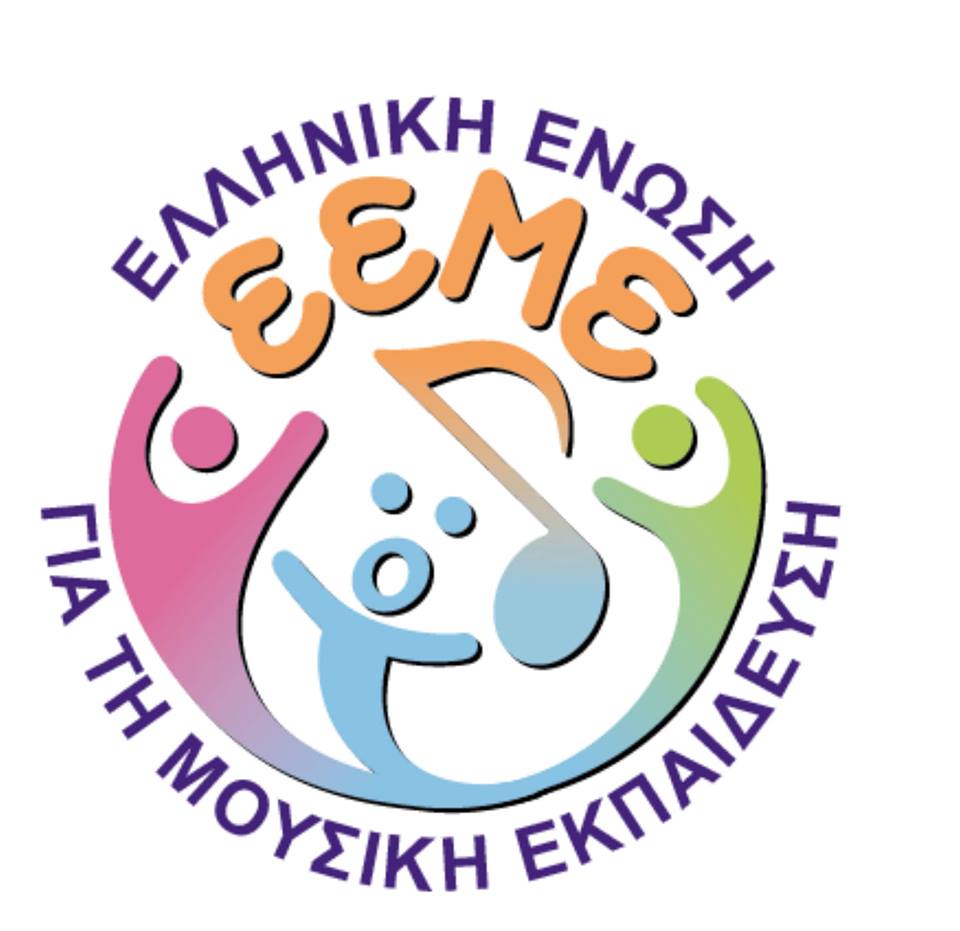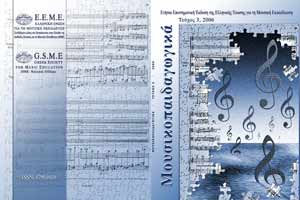1) Xanthoula Papapanagiotou: Greek students' musical preferences in relation to age and musical training.
2) Yannis Stavrou:The educational policy related to the teaching of music
in Primary School.
3) Polyvios Androutsos: Development and Experimental Implementation of a Model of Teaching the History of Music in Secondary Education.
4) Kyriaki Zacharopoulou: An introduction to mechanisms and strategies
used by performers to memorise music.
5) Maria Vraka: Absolute Pitch - The advantages and the drawbacks of a rare ability.
Abstracts
1) Xanthoula Papapanagiotou
Greek students' musical preferences in relation to age and musical training
This paper reports on two studies that were carried out in Greece and aimed at investigating Greek students musical preferences and their relationship to age and musical training. In the first study, 1061 students aged 6-7, 12-13 and 18-19 years gave questionnaire information and participated in a listening test during which they rated excerpts of 8 musical styles on a five-point Likert-type scale. The second study aimed at further investigating the relationship between musical preferences and training. Participants were 120 students equally distributed in three groups: 11 year old primary, 15 old year secondary and 15 year old music school. Students rated the stylistic «labels» of «pop», «classical» and «Greek traditional» music on a five-point Likert-type scale. Statistical analyses in both studies indicated a strong relationship between preferences, age and musical training. It was found that children respond more favourably to all styles of music than older students. Adolescents show strong preferences towards musical styles associated with young audiences. Young adults' musical preferences are more diverse compared to adolescents' and less diverse as compared to childrens' musical preferences. Musical training on an instrument of either «classical» or «Greek traditional» tradition was found to positively influence musical preferences for both traditions. The paper concludes that school music education in Greece should be enriched with musical praxis in diverse musical traditions.
2) Yannis Stavrou
The educational policy related to the teaching of music in Primary School
The educational policy applied in every society determines the educational goals and orientation, the subject matter and the content of books, the targets of the syllabus as well as every other parameter concerning the educational sections. Therefore, the place of music, traditional music in particular, in school reflects the attitude of the state, the priorities that it puts the model of personality of the citizens that it aims at formulating, its directions, its choices and its priorities. But it's a fact that the place of music in school has been determined by factors such as the inadequacy of the educationalists as well as the wrong perception that prevailed, according to which music is not connected with knowledge and consequently it should not be regarded as an essential school subject. In this article are presented the results of a research that aimed at investigating the attitudes and the opinions of educationalists who teach the subject of Music Education in Primary School (teachers specialized in the teaching of music as well as teachers in general), in terms of the educational policy related to the teaching of music as a whole, and traditional music in particular. The analysis of the data reveals that educationalists believe that the State does not promote the teaching of music with the means available to it. They are also dissatisfied with certain factors such as the syllabus, the visual aids, the classroom, the School Counselors, the seminars and further training sessions they have attended. Finally, they consider that in order for the targets aiming at the teaching of music to be fulfilled (including traditional music) it is necessary to make alterations in every factor that affects the potentiality of the subject.
3) Polyvios Androutsos
Development and Experimental Implementation of a Model of Teaching the History of Music in Secondary Education
The purpose of the study was to develop and implement a model of teaching the history of music in secondary education. The researcher investigated whether and to what degree this model facilitated student achievement in the history of music, including the development of skills of historic perception, comprehension of historic continuity, and listening recognition and placement of musical works in their historic framework. The model consisted of the following components: strategy, methods, tools, and teaching material. Subjects were ninthgrade public general secondary education students in Greece (N=176). An experimental-control group post-test only design was used. Eight intact classes were randomly assigned to experimental and control groups taking under consideration regional representation (i.e., urban and rural areas). The instruction period for both groups was 10 weeks, during which the Baroque and Classical eras of Western art music were covered. The experimental group was taught accordingly to the model whereas the control group according to the choices of the control group teachers. During the 11th week, a review and format trial test took place. During the 12th week, a multiplechoice format test, designed by the investigator, was administered. The results showed the test to be reliable. The data were analyzed through three-way ANOVA procedures. The statistically significant difference between the control and experimental groups in favor of the experimental group and the statistical significance of two interactions (treatment x gender and region x gender) demonstrated the success of the model and its components. The results in general showed that the model and its components had a substantial positive effect on male students' achievement. The model proved to be useful and viable and the teaching materials appropriate for actual use in the schools.
4) Kyriaki Zacharopoulou
An introduction to mechanisms and strategies used by performers to memorise music
Memory is a very significant cognitive process, which is used by musicians while studying and memorising a musical piece. The goal of the current article is to inform performers on the way their memory system works and in parallel, to suggest effective strategies of memorisation. In the first part of this article, a short description of the main psychological theories on memory processes will be made. In the second part, an account of the most common strategies in memorising music will be given, and the most effective will be proposed.
5) Maria Vraka
Absolute Pitch: The advantages and the drawbacks of a rare ability
Absolute Pitch is a relatively rare ability. An increased interest has been expressed on the matter by a number of investigators coming from scientific areas as different as psychoacoustics, neuroscience, developmental Psychology and Music Education. The immediate and accurate recognition of musical pitch seems to be affected by specific characteristics of musical sound such as musical 'chroma', timbre, pitch register. The ability is associated with the musical system of the Western Art European Music due to the dual nature of the trait: tonal memory and tonal labeling. Nevertheless, it is Relative Pitch rather than Absolute Pitch that is important in the previously mentioned musical tradition. The article tries to record the advantages and disadvantages of possessing AP, in a musical system that seems to ignore or rather not be in need of the ability. Some musical abilities can be underdeveloped in people with AP. The importance of a special educational approach is highlighted and some suggestions made.






 Please wait...
Please wait...